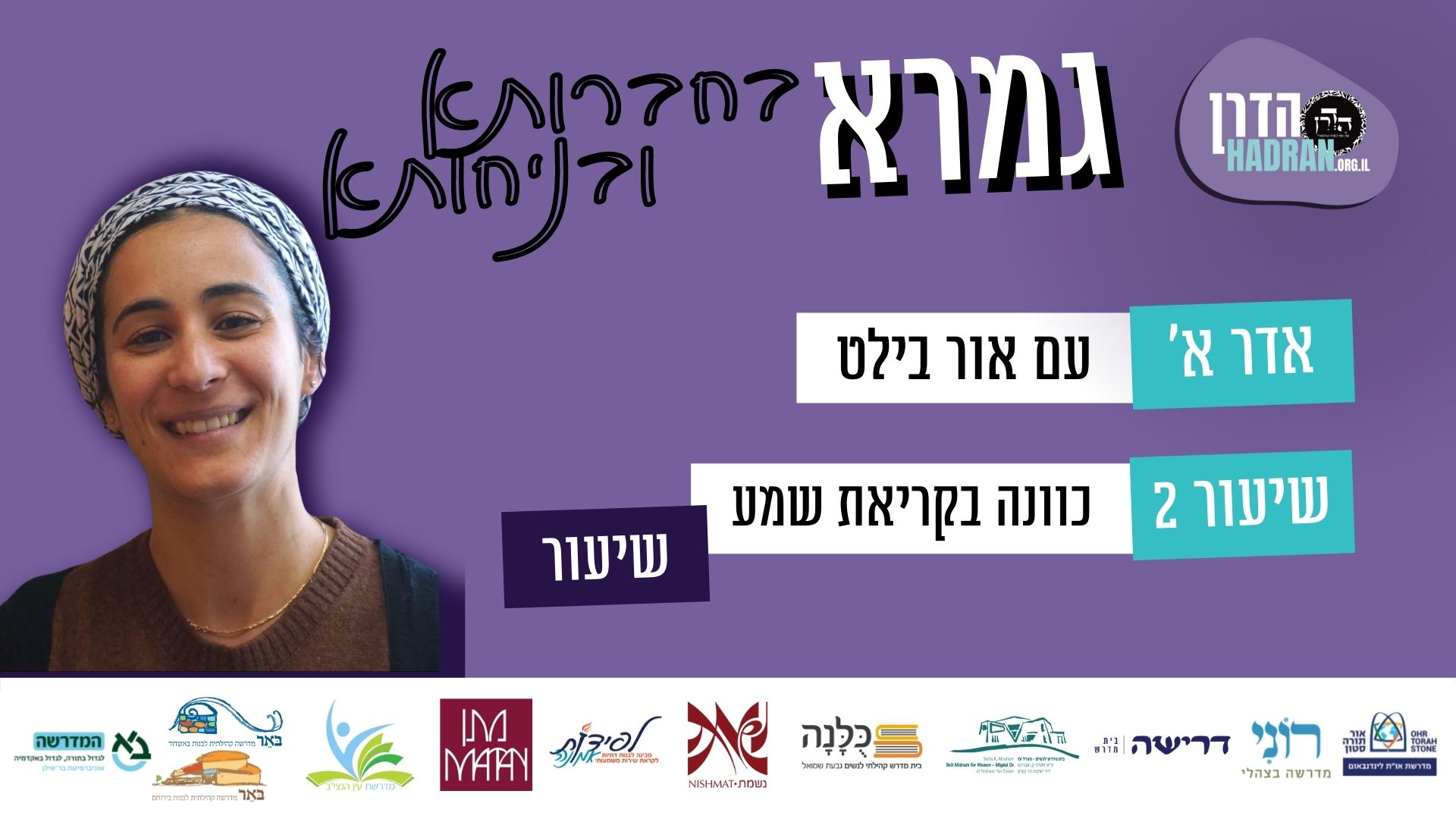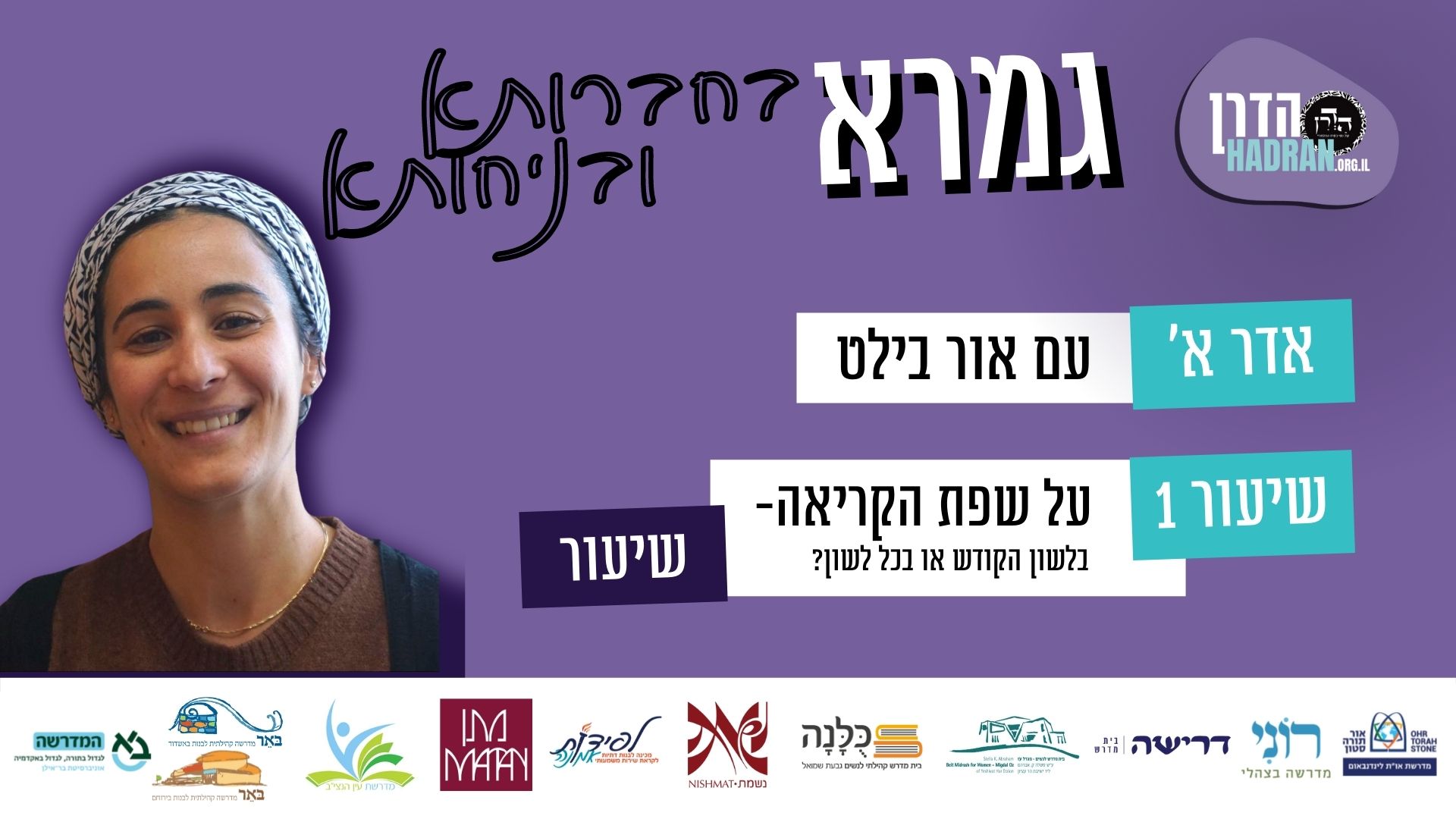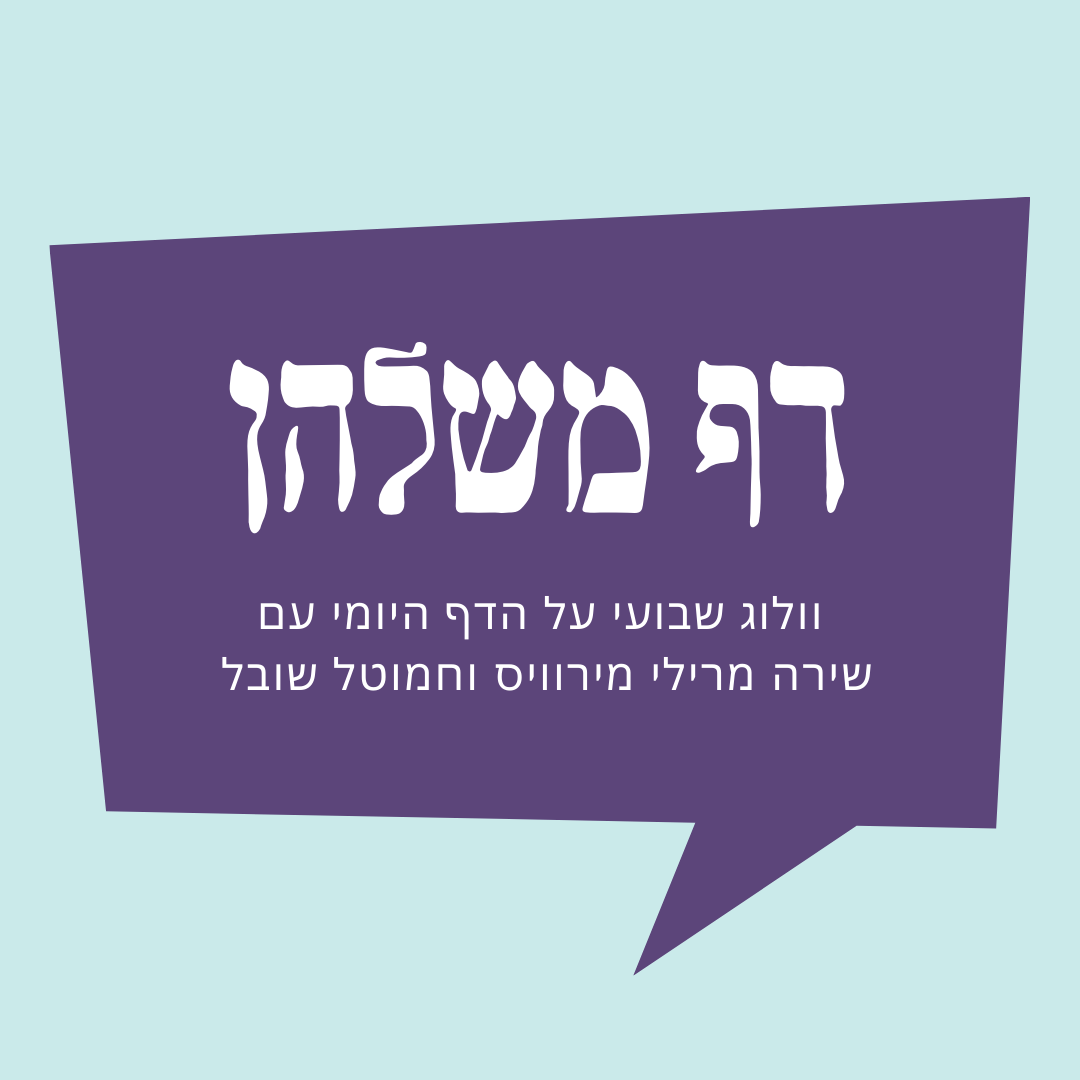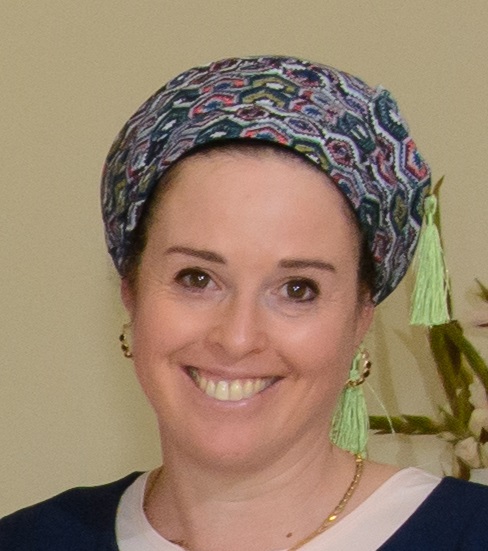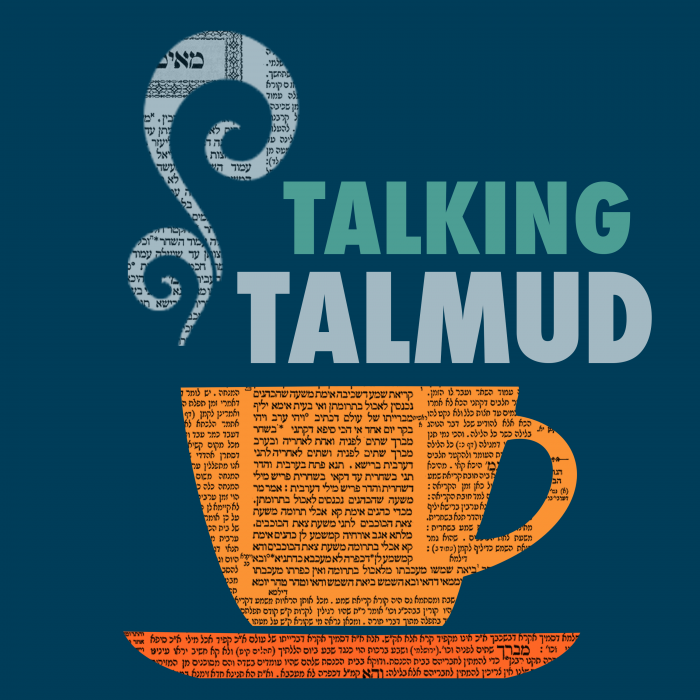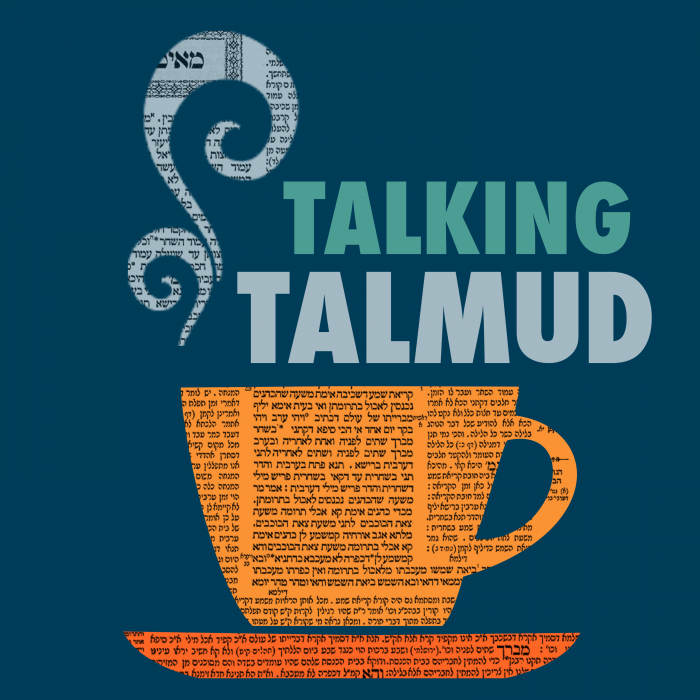מתי אומרים תפילת הדרך? מהן ההבדלים בין הביננו לתפילה קצרה? לאיזה כיוון מתפללים? מי שהולך בדרך לפני זמן תפילה וקריאת שמע, מה עושים? האם מתפללים מוסף ביחידות? מהן הדעות השונות? אם שכחו יעלה ויבוא, האם מתפללים שוב? במה זה תלוי? צריך להתפלל בכובד ראש – מאיפה דורשים את זה? מה המשמעות של "גילו ברעדה”?
הלימוד השבוע מוקדש לזכות ולשלום הַיְימׇנוֹט אֱמוּנָה בַּת באנצ’י (קָסָאוּ) בת 11 שנעלמה במקום מגוריה בצפת, לפני שנתיים, ביום ט”ז אדר תשפ”ד (25.2.24), ולא נודעו עקבותיה.
הלימוד השבוע מוקדש למען ביטחון המדינה, החיילים והאזרחים, ולמען חירותו של העם האיראני. שנזכה בקרוב שיתקיים בנו הפסוק: "לַיְּהוּדִים הָיְתָה אוֹרָה וְשִׂמְחָה וְשָׂשֹׂן וִיקָר”.
רוצה להקדיש שיעור?


כלים
הלימוד השבוע מוקדש לזכות ולשלום הַיְימׇנוֹט אֱמוּנָה בַּת באנצ’י (קָסָאוּ) בת 11 שנעלמה במקום מגוריה בצפת, לפני שנתיים, ביום ט”ז אדר תשפ”ד (25.2.24), ולא נודעו עקבותיה.
הלימוד השבוע מוקדש למען ביטחון המדינה, החיילים והאזרחים, ולמען חירותו של העם האיראני. שנזכה בקרוב שיתקיים בנו הפסוק: "לַיְּהוּדִים הָיְתָה אוֹרָה וְשִׂמְחָה וְשָׂשֹׂן וִיקָר”.
כלים
העמקה
רוצה להבין מה באמת קורה מתחת לפני השטח של הסוגיה?
שיעורים, פודקאסטים והרחבות של מיטב המורות שלנו יפתחו לך עוד זוויות וכיווני חשיבה.
חדשה בלימוד הגמרא?
זה הדף הראשון שלך? איזו התרגשות עצומה! יש לנו בדיוק את התכנים והכלים שיעזרו לך לעשות את הצעדים הראשונים ללמידה בקצב וברמה שלך, כך תוכלי להרגיש בנוח גם בתוך הסוגיות המורכבות ומאתגרות.
פסיפס הלומדות שלנו
גלי את קהילת הלומדות שלנו, מגוון נשים, רקעים וסיפורים. כולן חלק מתנועה ומסע מרגש ועוצמתי.
ברכות ל
לִישַׁתֵּף אִינָשׁ נַפְשֵׁיהּ בַּהֲדֵי צִבּוּרָא. הֵיכִי נֵימָא? — ״יְהִי רָצוֹן מִלְּפָנֶיךָ ה׳ אֱלֹהֵינוּ שֶׁתּוֹלִיכֵנוּ לְשָׁלוֹם״ וְכוּ׳.
a person should associate himself with the congregation and should not pray for himself alone. How should he say it? May it be Your will, Lord our God, that You lead us to peace, etc., in the plural.
אִימַּת מְצַלֵּי? אָמַר רַבִּי יַעֲקֹב אָמַר רַב חִסְדָּא: מִשָּׁעָה שֶׁמְּהַלֵּךְ בַּדֶּרֶךְ. עַד כַּמָּה? אָמַר רַבִּי יַעֲקֹב אָמַר רַב חִסְדָּא: עַד פַּרְסָה. וְהֵיכִי מְצַלֵּי לַהּ? רַב חִסְדָּא אָמַר: מְעוּמָּד. רַב שֵׁשֶׁת אָמַר: אֲפִילּוּ מְהַלֵּךְ.
The Gemara discusses specific details pertaining to this prayer. When does one pray? Rabbi Ya’akov said that Rav Ḥisda said: From when one sets out on his journey, and not before. How long must one’s planned journey be in order to require him to recite this prayer (Ba’al Halakhot Gedolot)? Rabbi Ya’akov said that Rav Ḥisda said: At least a parasang. How does he recite this prayer? Rav Ḥisda said: Only while standing in one place. Rav Sheshet said: Even walking or sitting.
רַב חִסְדָּא וְרַב שֵׁשֶׁת הֲווֹ קָאָזְלִי בְּאוֹרְחָא, קָם רַב חִסְדָּא וְקָא מְצַלֵּי. אָמַר לֵיהּ רַב שֵׁשֶׁת לְשַׁמָּעֵיהּ: מַאי קָא עָבֵיד רַב חִסְדָּא? אָמַר לֵיהּ קָאֵי וּמְצַלֵּי. אָמַר לֵיהּ: אוֹקְמַן נָמֵי לְדִידִי וַאֲצַלֵּי, ״מֵהֱיוֹת טוֹב אַל תִּקָּרֵא רַע״.
The Gemara relates: Rav Ḥisda and Rav Sheshet were walking along the path, Rav Ḥisda stood and recited the traveler’s prayer. Since he was blind and did not see his colleague, Rav Sheshet asked his servant: What is Rav Ḥisda doing now? His servant said to him: He is standing and praying. Rav Sheshet said to his servant: Stand me up as well and I will pray. Even though Rav Sheshet held that there is no need to stand during this prayer, nevertheless: From being good, do not be called wicked. In other words, one should do better if he is able. Rav Sheshet said that one is not required to stop and stand. He did not say that it is preferable to walk or sit. Since standing in this case required no special effort on his part, as Rav Ḥisda had stopped to stand and pray anyway, why insist on sitting?
מַאי אִיכָּא בֵּין ״הֲבִינֵנוּ״ לִתְפִלָּה קְצָרָה? ״הֲבִינֵנוּ״ בָּעֵי לְצַלּוֹיֵי שָׁלֹשׁ קַמָּיָיתָא וְשָׁלֹשׁ בָּתְרָיָיתָא, וְכִי מָטֵי לְבֵיתֵיהּ לָא בָּעֵי לְמֶהְדַּר לְצַלּוֹיֵי, בִּתְפִלָּה קְצָרָה, לָא בָּעֵי לְצַלּוֹיֵי לָא שָׁלֹשׁ קַמָּיָיתָא וְלָא שָׁלֹשׁ בָּתְרָיָיתָא, וְכִי מָטֵי לְבֵיתֵיהּ בָּעֵי לְמֶהְדַּר לְצַלּוֹיֵי.
The mishna mentioned both a brief prayer recited in times of danger and an abridged prayer, with regard to which there was a dispute between the tanna’im. The Gemara asks: What is the practical halakhic difference between the abridged prayer: Grant us understanding and the brief prayer recited in times of danger? The Gemara answers: One who recites: Grant us understanding is required to recite the first three blessings and the last three blessings of the Amida prayer, and when he reaches his home, he need not pray again. One who recites the brief prayer, however, need recite neither the first three blessings nor the last three blessings of the Amida prayer. However, when he reaches his home, he must pray again. Grant us understanding has the legal status of the Amida prayer, despite its brevity, while the brief prayer is merely recited in place of the Amida prayer in exigent circumstances.
וְהִלְכְתָא: ״הֲבִינֵנוּ״, מְעוּמָּד, תְּפִלָּה קְצָרָה, בֵּין מְעוּמָּד בֵּין מְהַלֵּךְ.
The halakha is: Grant us understanding, as mentioned above, has the legal status of the Amida prayer, and must therefore be recited while standing. The brief prayer, since it does not have that status, may be recited whether one is standing or whether one is walking.
הָיָה רוֹכֵב עַל הַחֲמוֹר וְכוּ׳. תָּנוּ רַבָּנַן: הָיָה רוֹכֵב עַל הַחֲמוֹר וְהִגִּיעַ זְמַן תְּפִלָּה, אִם יֵשׁ לוֹ מִי שֶׁיֹּאחַז אֶת חֲמוֹרוֹ — יֵרֵד לְמַטָּה וְיִתְפַּלֵּל, וְאִם לָאו — יֵשֵׁב בִּמְקוֹמוֹ וְיִתְפַּלֵּל. רַבִּי אוֹמֵר: בֵּין כָּךְ וּבֵין כָּךְ יֵשֵׁב בִּמְקוֹמוֹ וְיִתְפַּלֵּל, לְפִי שֶׁאֵין דַּעְתּוֹ מְיוּשֶּׁבֶת עָלָיו.
We learned in the mishna: One who was riding on a donkey should dismount and pray. Only in exigent circumstances may he pray while riding, focusing his heart toward Jerusalem and the Holy of Holies. The Sages taught in a Tosefta: One who was riding on a donkey and the time for prayer arrived, if he has someone to hold onto the donkey, he should dismount and pray. If not, he should sit in his place atop the donkey and pray. Rabbi Yehuda HaNasi says: In any case, whether or not there is someone to hold onto the donkey, he should sit in his place atop the donkey and pray, as his mind will not be calm. Since he is hurrying to arrive at his destination, the need to dismount the donkey, stand in prayer, and remount the donkey would delay his journey, and the delay is likely to interfere with his concentration during prayer.
אָמַר רָבָא, וְאִיתֵּימָא רַבִּי יְהוֹשֻׁעַ בֶּן לֵוִי: הֲלָכָה כְּרַבִּי.
Rava, and some say Rabbi Yehoshua ben Levi, said: The halakha here is in accordance with the opinion of Rabbi Yehuda HaNasi.
תָּנוּ רַבָּנַן: סוֹמֵא וּמִי שֶׁאֵינוֹ יָכוֹל לְכַוֵּין אֶת הָרוּחוֹת — יְכַוֵּין לִבּוֹ כְּנֶגֶד אָבִיו שֶׁבַּשָּׁמַיִם, שֶׁנֶּאֱמַר: ״וְהִתְפַּלְלוּ אֶל ה׳״.
The Sages taught in a Tosefta: A blind person and one who is unable to approximate the directions and, therefore, is unable to face Jerusalem in order to pray, may focus his heart towards his Father in Heaven, as it is stated: “And they shall pray to the Lord” (I Kings 8:44).
הָיָה עוֹמֵד בְּחוּץ לָאָרֶץ — יְכַוֵּין אֶת לִבּוֹ כְּנֶגֶד אֶרֶץ יִשְׂרָאֵל, שֶׁנֶּאֱמַר: ״וְהִתְפַּלְלוּ אֵלֶיךָ דֶּרֶךְ אַרְצָם״. הָיָה עוֹמֵד בְּאֶרֶץ יִשְׂרָאֵל — יְכַוֵּין אֶת לִבּוֹ כְּנֶגֶד יְרוּשָׁלַיִם, שֶׁנֶּאֱמַר: ״וְהִתְפַּלְלוּ אֶל ה׳ דֶּרֶךְ הָעִיר אֲשֶׁר בָּחַרְתָּ״. הָיָה עוֹמֵד בִּירוּשָׁלַיִם — יְכַוֵּין אֶת לִבּוֹ כְּנֶגֶד בֵּית הַמִּקְדָּשׁ, שֶׁנֶּאֱמַר: ״וְהִתְפַּלְלוּ אֶל הַבַּיִת הַזֶּה״. הָיָה עוֹמֵד בְּבֵית הַמִּקְדָּשׁ — יְכַוֵּין אֶת לִבּוֹ כְּנֶגֶד בֵּית קׇדְשֵׁי הַקֳּדָשִׁים, שֶׁנֶּאֱמַר: ״וְהִתְפַּלְלוּ אֶל הַמָּקוֹם הַזֶּה״. הָיָה עוֹמֵד בְּבֵית קׇדְשֵׁי הַקֳּדָשִׁים — יְכַוֵּין אֶת לִבּוֹ כְּנֶגֶד בֵּית הַכַּפּוֹרֶת. הָיָה עוֹמֵד אֲחוֹרֵי בֵּית הַכַּפּוֹרֶת — יִרְאֶה עַצְמוֹ כְּאִילּוּ לִפְנֵי הַכַּפּוֹרֶת. נִמְצָא עוֹמֵד בַּמִּזְרָח מַחֲזִיר פָּנָיו לַמַּעֲרָב. בַּמַּעֲרָב מַחֲזִיר פָּנָיו לַמִּזְרָח. בַּדָּרוֹם — מַחֲזִיר פָּנָיו לַצָּפוֹן. בַּצָּפוֹן — מַחֲזִיר פָּנָיו לַדָּרוֹם. נִמְצְאוּ כׇּל יִשְׂרָאֵל מְכַוְּונִין אֶת לִבָּם לְמָקוֹם אֶחָד.
One who was standing in prayer in the Diaspora should focus his heart toward Eretz Yisrael, as it is stated: “And they shall pray to You by way of their land which You have given to their fathers” (I Kings 8:48).
One who was standing in Eretz Yisrael should focus his heart toward Jerusalem, as it is stated: “And they shall pray to the Lord by way of the city that You have chosen” (I Kings 8:44).
One who was standing in Jerusalem should focus his heart toward the Temple, as it is stated: “And they shall pray toward this house” (II Chronicles 6:32).
One who was standing in the Temple should focus his heart toward the Holy of Holies, as it is stated: “And they shall pray toward this place” (I Kings 8:35).
One who was standing in the Holy of Holies should focus his heart toward the seat of the ark-cover [kapporet], atop the ark, the dwelling place of God’s glory.
One who was standing behind the seat of the ark-cover should visualize himself as if standing before the ark-cover and turn toward it.
Consequently, one standing in prayer in the East turns to face west, and one standing in the West turns to face east. One standing in the South turns to face north, and one standing in the North turns to face south; Consequently, all of the people of Israel focus themselves focusing their hearts toward one place, the Holy of Holies in the Temple.
אָמַר רַבִּי אָבִין, וְאִיתֵּימָא רַבִּי אֲבִינָא: מַאי קְרָאָה — ״כְּמִגְדַּל דָּוִיד צַוָּארֵךְ בָּנוּי לְתַלְפִּיּוֹת״ — תֵּל שֶׁכָּל פִּיּוֹת פּוֹנִים בּוֹ.
An allusion to this is found in what Rabbi Avin, and some say Rabbi Avina, said: What verse alludes to this? “Your neck is like the Tower of David, built with turrets [talpiyyot], one thousand shields hang from it, all of the armor of the mighty” (Song of Songs 4:4). He interprets the word talpiyyot as the hill [tel] toward which all mouths [piyyot] turn, i.e., the Temple Mount.
אֲבוּהּ דִּשְׁמוּאֵל וְלֵוִי, כִּי הֲווֹ בָּעוּ לְמִיפַּק לְאוֹרְחָא, הֲווֹ מְקַדְּמִי וּמְצַלִּי, וְכִי הֲוָה מָטֵי זְמַן קְרִיאַת שְׁמַע קָרוּ.
With regard to prayer while traveling, the Gemara relates: When Shmuel’s father and Levi wanted to set out on a journey in the morning, they would pray early before sunrise. When, during their journey, the time to recite Shema would arrive, they recited it.
כְּמַאן — כִּי הַאי תַּנָּא. דְּתַנְיָא: הִשְׁכִּים לָצֵאת לַדֶּרֶךְ, מְבִיאִין לוֹ שׁוֹפָר וְתוֹקֵעַ, לוּלָב וּמְנַעְנֵעַ, מְגִילָּה וְקוֹרֵא בָּהּ, וּכְשֶׁיַּגִּיעַ זְמַן קְרִיאַת שְׁמַע — קוֹרֵא. הִשְׁכִּים לֵישֵׁב בַּקָּרוֹן אוֹ בִּסְפִינָה — מִתְפַּלֵּל, וּכְשֶׁיַּגִּיעַ זְמַן קְרִיאַת שְׁמַע — קוֹרֵא.
The Gemara asks: In accordance with whose opinion did they do this? In accordance with this tanna, as it was taught in the Tosefta: One who rose early to set out on his path before the time to recite Shema arrives, they bring him a shofar and he sounds it, if it was Rosh HaShana; a lulav and he takes it on Sukkot; a megilla, the Scroll of Esther, and he reads it on Purim; and when the time comes to recite Shema, he recites it. So too, one who rose early to sit in a wagon or in a boat prays, and when the time comes to recite Shema, he recites it.
רַבִּי שִׁמְעוֹן בֶּן אֶלְעָזָר אוֹמֵר: בֵּין כָּךְ וּבֵין כָּךְ קוֹרֵא קְרִיאַת שְׁמַע וּמִתְפַּלֵּל, כְּדֵי שֶׁיִּסְמוֹךְ גְּאוּלָּה לִתְפִלָּה.
Rabbi Shimon ben Elazar, says: In either case, it is preferable to recite Shema and then pray the Amida prayer in the wagon so that he will juxtapose redemption and prayer.
בְּמַאי קָמִיפַּלְגִי? מָר סָבַר תְּפִלָּה מְעוּמָּד עָדִיף, וּמָר סָבַר מִסְמָךְ גְּאוּלָּה לִתְפִלָּה עָדִיף.
The Gemara explains: Regarding what do they disagree? The Gemara answers: This Sage, the first tanna, holds that prayer while standing is preferable. Therefore, one should pray earlier, at home, while standing. This Sage, Rabbi Shimon ben Elazar, holds that the juxtaposition of redemption and prayer is preferable, even if in doing so one is unable to stand while praying.
מָרִימָר וּמָר זוּטְרָא הֲווֹ מְכַנְּפִי בֵּי עַשְׂרָה בְּשַׁבְּתָא דְרִגְלָא וּמְצַלּוּ, וַהֲדַר נָפְקִי לְפִרְקָא.
On a similar note, the Gemara cites additional circumstances where Sages were forced to make exceptional arrangements to pray. Mareimar and Mar Zutra would gather ten people on the Shabbat of the festival and pray, and set out to deliver their lecture [pirka]. Due to the crowds that gathered to hear the lectures of the Sages on the festival, they were unable to pray at the proper time, so they were forced to pray earlier.
רַב אָשֵׁי מְצַלֵּי בַּהֲדֵי צִבּוּרָא בְּיָחִיד, מְיוּשָּׁב. כִּי הֲוָה אָתֵי לְבֵיתֵיהּ, הָדַר וּמְצַלֵּי מְעוּמָּד. אָמְרִי לֵיהּ רַבָּנַן: וְלַעֲבֵיד מָר כְּמָרִימָר וּמָר זוּטְרָא! אֲמַר לְהוּ: טְרִיחָא לִי מִלְּתָא. וְלַעֲבֵיד מָר כַּאֲבוּהּ דִּשְׁמוּאֵל וְלֵוִי! אֲמַר לְהוּ: לָא חֲזֵינָא לְהוּ לְרַבָּנַן קַשִּׁישֵׁי מִינַּן דְּעָבְדִי הָכִי.
In similar circumstances, Rav Ashi would pray with the congregation individually while seated, so that they would not notice that he was praying. Afterwards, when he would come to his house, he would pray again while standing in order to pray without distraction. The Sages said to him: The Master should do as Mareimar and Mar Zutra do, i.e., gather a prayer quorum at home to pray before the lecture. He said to them: It is burdensome to me to delay the lecture so much. The Sages said to him: The Master should do as Shmuel’s father and Levi did and pray before sunrise. He said to them: I have not seen Sages older than us do that, indicating that this is not the accepted halakha.
מַתְנִי׳ רַבִּי אֶלְעָזָר בֶּן עֲזַרְיָה אוֹמֵר: אֵין תְּפִלַּת הַמּוּסָפִין אֶלָּא בְּחֶבֶר עִיר. וַחֲכָמִים אוֹמְרִים: בְּחֶבֶר עִיר וְשֶׁלֹּא בְּחֶבֶר עִיר. רַבִּי יְהוּדָה אוֹמֵר מִשְּׁמוֹ: כׇּל מָקוֹם שֶׁיֵּשׁ שָׁם חֶבֶר עִיר — יָחִיד פָּטוּר מִתְּפִלַּת הַמּוּסָפִין.
MISHNA: Rabbi Elazar ben Azarya says: The additional prayer is only recited in a city where there is a quorum of ten [ḥever ir]. The Rabbis say: One may recite the additional prayer with a ḥever ir or without a ḥever ir. Rabbi Yehuda says another opinion in his name, the name of Rabbi Elazar ben Azarya: Any place where there is a ḥever ir, an individual is completely exempt from reciting the additional prayer.
גְּמָ׳ רַבִּי יְהוּדָה הַיְינוּ תַּנָּא קַמָּא! אִיכָּא בֵּינַיְיהוּ יָחִיד שֶׁלֹּא בְּחֶבֶר עִיר, תַּנָּא קַמָּא סָבַר פָּטוּר. וְרַבִּי יְהוּדָה סָבַר חַיָּיב.
GEMARA: There is no apparent difference between the opinion of Rabbi Elazar ben Azarya and the opinion cited in his name by Rabbi Yehuda. The Gemara asks: Rabbi Yehuda’s opinion is identical to the opinion of Rabbi Elazar ben Azarya cited by the first tanna. The Gemara answers: There is a practical halakhic difference between them: The case of an individual who is not in a place where there is a ḥever ir. In other words, in a place where there is not a prayer quorum of ten people, the first tanna holds that Rabbi Elazar ben Azarya’s opinion is that the individual is exempt from reciting the additional prayer, as it was only instituted to be recited with a quorum. And Rabbi Yehuda holds that Rabbi Elazar ben Azarya’s opinion is that the individual is obligated to recite the additional prayer, as he is only exempt in a place where there is a prayer quorum, and, therefore, a communal prayer leader fulfills his obligation.
אָמַר רַב הוּנָא בַּר חִינָּנָא אָמַר רַב חִיָּיא בַּר רַב: הֲלָכָה כְּרַבִּי יְהוּדָה שֶׁאָמַר מִשּׁוּם רַבִּי אֶלְעָזָר בֶּן עֲזַרְיָה. אָמַר לֵיהּ רַב חִיָּיא בַּר אָבִין: שַׁפִּיר קָאָמְרַתְּ, דְּאָמַר שְׁמוּאֵל: מִימַי לָא מְצַלֵּינָא צְלוֹתָא דְמוּסָפִין בְּיָחִיד
Rav Huna bar Ḥinnana said that Ḥiyya bar Rav said: The halakha is in accordance with the opinion of Rabbi Yehuda, who said it in the name of his mentor, Rabbi Elazar ben Azarya. Rav Ḥiyya bar Avin said to him: You have spoken well, as proven by what Shmuel said: In all my days I have never prayed the additional prayer as an individual
בִּנְהַרְדְּעָא, לְבַר מֵהָהוּא יוֹמָא דַּאֲתָא פּוּלְמוּסָא דְמַלְכָּא לְמָתָא, וְאִטְּרִידוּ רַבָּנַן וְלָא צַלּוֹ, וְצַלִּי לִי בְּיָחִיד, וַהֲוַאי יָחִיד שֶׁלֹּא בְּחֶבֶר עִיר.
in Neharde’a, where there is always a prayer quorum, except for the day when the king’s army [pulmusa] came to the city, and the Sages were preoccupied and did not pray communally, and I prayed as an individual, and I was an individual who was not praying in a prayer quorum. Shmuel’s conduct was in accordance with the opinion of Rabbi Yehuda in this matter.
יָתֵיב רַבִּי חֲנִינָא קָרָא קַמֵּיהּ דְּרַבִּי יַנַּאי, וְיָתֵיב וְקָאָמַר: הֲלָכָה כְּרַבִּי יְהוּדָה שֶׁאָמַר מִשּׁוּם רַבִּי אֶלְעָזָר בֶּן עֲזַרְיָה. אֲמַר לֵיהּ: פּוּק קְרֵא קְרָאָיךְ לְבָרָא, דְּאֵין הֲלָכָה כְּרַבִּי יְהוּדָה שֶׁאָמַר מִשּׁוּם רַבִּי אֶלְעָזָר בֶּן עֲזַרְיָה.
Yet this opinion was not universally accepted. The Gemara relates: Rabbi Ḥanina Kara, the Bible expert, sat before Rabbi Yannai, and he sat and he said: The halakha is in accordance with the opinion of Rabbi Yehuda who said it in the name of Rabbi Elazar ben Azarya. Rabbi Yannai said to him: Go and read your verses outside, as that halakha is not accepted by the Sages in the study hall, and it belongs outside, as the halakha is not in accordance with the opinion of Rabbi Yehuda who said it in the name of Rabbi Elazar ben Azarya.
אָמַר רַבִּי יוֹחָנָן: אֲנִי רָאִיתִי אֶת רַבִּי יַנַּאי דְּצַלִּי וַהֲדַר צַלִּי. אֲמַר לֵיהּ רַבִּי יִרְמְיָה לְרַבִּי זֵירָא: וְדִילְמָא מֵעִיקָּרָא לָא כַּוֵּון דַּעְתֵּיהּ וּלְבַסּוֹף כַּוֵּון דַּעְתֵּיהּ. אֲמַר לֵיהּ: חֲזִי מַאן גַּבְרָא רַבָּה דְּקָמַסְהֵיד עֲלֵיהּ.
Rabbi Yoḥanan said: I saw Rabbi Yannai, who prayed and then prayed again. Presumably, his first prayer was the morning prayer and his second prayer was the additional prayer. Apparently, he does not hold in accordance with the opinion of Rabbi Elazar ben Azarya. Rather, he holds that even when not part of a prayer quorum, an individual must recite the additional prayer. Later on, when this story was related in the study hall, Rabbi Yirmeya said to his teacher, Rabbi Zeira: What proof is there that the second prayer was the additional prayer? Perhaps initially he did not focus his mind on his prayer and ultimately he focused his mind, i.e., he repeated the morning prayer in order to do so with proper concentration. Rabbi Zeira said to him: Look at who the great man is who is testifying about him. Rabbi Yoḥanan certainly observed carefully before relating what he witnessed.
רַבִּי אַמֵּי וְרַבִּי אַסִּי אַף עַל גַּב דַּהֲווֹ לְהוּ תְּלֵיסַר בֵּי כְנִישְׁתָּא בִּטְבֶרְיָא לָא הֲווֹ מְצַלּוּ אֶלָּא בֵּינֵי עַמּוּדֵי, הֵיכָא דַּהֲווֹ גָּרְסִי.
Regarding prayers of the Sages, the Gemara further relates that, although there were thirteen synagogues in Tiberias, Rabbi Ami and Rabbi Asi would only pray between the columns where they studied, as prayer is beloved in the eyes of God, specifically in a place of Torah.
אִיתְּמַר, רַב יִצְחָק בַּר אַבְדִּימִי מִשּׁוּם רַבֵּינוּ אָמַר: הֲלָכָה כְּרַבִּי יְהוּדָה שֶׁאָמַר מִשּׁוּם רַבִּי אֶלְעָזָר בֶּן עֲזַרְיָה. רַבִּי חִיָּיא בַּר אַבָּא צַלִּי וַהֲדַר צַלִּי. אֲמַר לֵיהּ רַבִּי זֵירָא: מַאי טַעְמָא עָבֵיד מָר הָכִי? אִילֵּימָא מִשּׁוּם דְּלָא כַּוֵּון מָר דַּעְתֵּיהּ, וְהָאָמַר רַבִּי אֱלִיעֶזֶר: לְעוֹלָם יָמוֹד אָדָם אֶת עַצְמוֹ, אִם יָכוֹל לְכַוֵּין אֶת לִבּוֹ — יִתְפַּלֵּל, וְאִם לָאו — אַל יִתְפַּלֵּל. אֶלָּא דְּלָא אַדְכַּר מָר דְּרֵישׁ יַרְחָא.
It was stated: Rav Yitzḥak bar Avdimi in the name of Rabbeinu, Rav, said: The halakha is in accordance with the opinion of Rabbi Yehuda who said it in the name of Rabbi Elazar ben Azarya. The Gemara relates: Rabbi Ḥiyya bar Abba prayed and then prayed again. Rav Zeira said to him: Why did the Master do this? If you say because the Master did not focus his mind the first time, didn’t Rabbi Eliezer say: One must always evaluate himself before he prays? If he is able to focus his heart on prayer, he should pray, but if not, if he is unable to do so, he should not pray. Apparently, that was not the reason that he prayed twice. Rather, because my Master did not mention the New Moon in his prayer, so he prayed again.
וְהָתַנְיָא טָעָה וְלֹא הִזְכִּיר שֶׁל רֹאשׁ חֹדֶשׁ, בְּעַרְבִית — אֵין מַחֲזִירִין אוֹתוֹ, מִפְּנֵי שֶׁיָּכוֹל לְאוֹמְרָהּ בְּשַׁחֲרִית. בְּשַׁחֲרִית — אֵין מַחֲזִירִין אוֹתוֹ, מִפְּנֵי שֶׁיָּכוֹל לְאוֹמְרָהּ בְּמוּסָפִין. בְּמוּסָפִין — אֵין מַחֲזִירִין אוֹתוֹ, מִפְּנֵי שֶׁיָּכוֹל לְאוֹמְרָהּ בְּמִנְחָה.
The Gemara asks: Wasn’t it taught in a baraita: One who erred and did not mention the New Moon in the evening prayer, we do not require him to return to the beginning of the prayer and repeat it, because he can recite it in the morning prayer. One who erred and did not mention the New Moon in the morning prayer, we do not require him to return to the beginning of the prayer and repeat it, because he can recite it in the additional prayer. One who erred and did not mention the New Moon in the additional prayer, we do not require him to return to the beginning of the prayer and repeat it, because he can recite it in the afternoon prayer? Omitting mention of the New Moon does not require one to repeat the Amida prayer. Consequently, that was not the reason that Rabbi Ḥiyya bar Abba prayed a second time.
אֲמַר לֵיהּ: לָאו אִיתְּמַר עֲלַהּ אָמַר רַבִּי יוֹחָנָן בְּצִבּוּר שָׁנוּ.
Rabbi Ḥiyya bar Abba said to him: Wasn’t it stated about that baraita that Rabbi Yoḥanan said: They taught this baraita specifically with regard to prayer in a communal framework? However, an individual who fails to mention the New Moon is required to pray again? That is why Rabbi Ḥiyya bar Abba prayed twice.
כַּמָּה יִשְׁהֶה בֵּין תְּפִלָּה לִתְפִלָּה? רַב הוּנָא וְרַב חִסְדָּא. חַד אָמַר: כְּדֵי שֶׁתִּתְחוֹנֵן דַּעְתּוֹ עָלָיו, וְחַד אָמַר: כְּדֵי שֶׁתִּתְחוֹלֵל דַּעְתּוֹ עָלָיו.
Stemming from the discussion about individuals who recite two prayers consecutively, the Gemara asks: How long should one wait between the first prayer and the second prayer? Rav Huna and Rav Ḥisda agreed about this in principle, but they formulated their opinions differently (Rashi). One said that an individual must wait long enough so that his mind will be in a pleading mode [titḥonen], enabling him to recite the second prayer as a plea. One of them said: Long enough so that his mind will be in a beseeching mode [titḥolel], enabling him to beseech God in his second prayer.
מַאן דְּאָמַר ״כְּדֵי שֶׁתִּתְחוֹנֵן דַּעְתּוֹ עָלָיו״, דִּכְתִיב: ״וָאֶתְחַנַּן אֶל ה׳״. וּמַאן דְּאָמַר ״כְּדֵי שֶׁתִּתְחוֹלֵל דַּעְתּוֹ עָלָיו״, דִּכְתִיב: ״וַיְחַל מֹשֶׁה״.
The Gemara points out that both Rav Huna and Rav Ḥisda based their positions on the prayers of Moses. The one who said: So that his mind will be in a pleading mode [titḥonen], as it is written: “And I pleaded [va’etḥanan] before the Lord” (Deuteronomy 3:23). And the one who said: So that his mind will be in a beseeching mode [titḥolel] as it is written: “And Moses besought [vayeḥal] the Lord” (Exodus 32:11).
אָמַר רַב עָנָן אָמַר רַב: טָעָה וְלֹא הִזְכִּיר שֶׁל רֹאשׁ חֹדֶשׁ עַרְבִית — אֵין מַחֲזִירִין אוֹתוֹ, לְפִי שֶׁאֵין בֵּית דִּין מְקַדְּשִׁין אֶת הַחֹדֶשׁ אֶלָּא בַּיּוֹם.
The Gemara resumes the above discussion with regard to omission of the mention of the New Moon in the Amida prayer. Rav Anan said that Rav said: One who erred and did not mention the New Moon in the evening prayer, we do not require him to return to the beginning of the prayer and repeat it, because the court only sanctifies the new month by day, and the prayer of the New Moon, which parallels the court’s sanctification of the new month, belongs in the daytime prayer.
אָמַר אַמֵּימָר: מִסְתַּבְּרָא מִילְּתָא דְּרַב בְּחֹדֶשׁ מָלֵא. אֲבָל בְּחֹדֶשׁ חָסֵר — מַחֲזִירִין אוֹתוֹ.
Ameimar said: Rav’s statement is reasonable in a full month, i.e., a month in which there are two potential days of the New Moon, the thirtieth day of the previous month and the first day of the new month. If one neglected to mention the New Moon on the night of the thirtieth, we do not require him to return to the beginning of the prayer and repeat it, because he can mention it the next night, which is the night of the first of the new month, which is the primary day of the New Moon. But in a short month of twenty-nine days, followed by one day of the New Moon, we require him to return to the beginning of the prayer and repeat it, even in the evening prayer.
אֲמַר לֵיהּ רַב אָשֵׁי לְאַמֵּימָר: מִכְּדֵי רַב טַעְמָא קָאָמַר, מָה לִי חָסֵר וּמָה לִי מָלֵא?! אֶלָּא לָא שְׁנָא.
Rav Ashi said to Ameimar: Since Rav states a reason for his statement, what difference is there to me if the month is short, and what difference is there to me if it is full? Rather, there is no difference. Rav based his opinion on the parallel drawn between the sanctification of the month and the mention of the New Moon in the Amida prayer; the sanctification of the month is not relevant at night.
הדרן עלך תפלת השחר
מַתְנִי׳ אֵין עוֹמְדִין לְהִתְפַּלֵּל אֶלָּא מִתּוֹךְ כּוֹבֶד רֹאשׁ. חֲסִידִים הָרִאשׁוֹנִים הָיוּ שׁוֹהִין שָׁעָה אַחַת, וּמִתְפַּלְּלִין, כְּדֵי שֶׁיְּכַוְּונוּ לִבָּם לַאֲבִיהֶם שֶׁבַּשָּׁמַיִם. אֲפִילּוּ הַמֶּלֶךְ שׁוֹאֵל בִּשְׁלוֹמוֹ — לֹא יְשִׁיבֶנּוּ, וַאֲפִילּוּ נָחָשׁ כָּרוּךְ עַל עֲקֵבוֹ — לֹא יַפְסִיק.
MISHNA: One may only stand and begin to pray from an approach of gravity and submission. There is a tradition that the early generations of pious men would wait one hour, in order to reach the solemn frame of mind appropriate for prayer, and then pray, so that they would focus their hearts toward their Father in Heaven. Standing in prayer is standing before God and, as such, even if the king greets him, he should not respond to him; and even if a snake is wrapped on his heel, he should not interrupt his prayer.
גְּמָ׳ מְנָא הָנֵי מִילֵּי? אָמַר רַבִּי אֶלְעָזָר: דְּאָמַר קְרָא ״וְהִיא מָרַת נָפֶשׁ״.
GEMARA: We learned in the mishna that prayer should be undertaken in an atmosphere of gravity. The Gemara asks: From where are these matters derived? Rabbi Elazar said: They are derived from the verses describing the prayer of Hannah, mother of Samuel, as the verse states: “And she felt bitterness of soul, and she prayed to the Lord and she wept and wept” (I Samuel 1:10).
מִמַּאי? דִּילְמָא חַנָּה שָׁאנֵי, דַּהֲוָת מְרִירָא לִבָּא טוּבָא.
The Gemara rejects this proof: From what does that conclusion ensue? Perhaps Hannah is different, as her heart was extremely embittered, her prayer was embittered as well. This does not prove that everyone must pray in that frame of mind.
אֶלָּא אָמַר רַבִּי יוֹסֵי בְּרַבִּי חֲנִינָא, מֵהָכָא: ״וַאֲנִי בְּרֹב חַסְדְּךָ אָבוֹא בֵיתֶךָ אֶשְׁתַּחֲוֶה אֶל הֵיכַל קׇדְשְׁךָ בְּיִרְאָתֶךָ״.
Rather, Rabbi Yosei, son of Rabbi Ḥanina, said, it can be proved from here, as David said: “But as for me, by Your abundant loving-kindness I will enter Your house, at Your Holy Temple I will bow in reverence for You” (Psalms 5:8). Entering into prayer like entering the Holy Temple must be performed reverentially.
מִמַּאי? דִּילְמָא דָּוִד שָׁאנֵי, דַּהֲוָה מְצַעַר נַפְשֵׁיהּ בְּרַחֲמֵי טוּבָא. אֶלָּא אָמַר רַבִּי יְהוֹשֻׁעַ בֶּן לֵוִי, מֵהָכָא: ״הִשְׁתַּחֲווּ לַה׳ בְּהַדְרַת קֹדֶשׁ״: אַל תִּקְרֵי ״בְּהַדְרַת״ אֶלָּא ״בְּחֶרְדַּת״.
The Gemara rejects this proof as well: From what does that conclusion ensue? Perhaps David is different, as he would excessively afflict himself in prayer in order to atone for his transgression with Bathsheba. Consequently, his cannot serve as a paradigm for proper conduct in prayer. Rather, Rabbi Yehoshua ben Levi said, it can be derived from here, from this verse that David said, not about his own worship, but about worship of God in general: “Give, unto the Lord, the honor of His name, bow to the Lord in the beauty of holiness [behadrat kodesh]” (Psalms 29:2). Do not read: In the beauty of [behadrat] holiness. Rather read: In trembling of [beḥerdat] holiness; one must enter into prayer from an atmosphere of gravity engendered by sanctity.
מִמַּאי? דִּילְמָא לְעוֹלָם אֵימָא לְךָ, ״הַדְרַת״ מַמָּשׁ. כִּי הָא דְּרַב יְהוּדָה הֲוָה מְצַיֵּין נַפְשֵׁיהּ, וַהֲדַר מְצַלֵּי. אֶלָּא אָמַר רַב נַחְמָן בַּר יִצְחָק מֵהָכָא: ״עִבְדוּ אֶת ה׳ בְּיִרְאָה וְגִילוּ בִּרְעָדָה״.
The Gemara rejects this too: From what does that conclusion ensue? Perhaps, actually I would say to you that it should be read as it is written: Specifically, “in the beauty,” and it means that one should pray in beautiful clothing, as in the case of Rav Yehuda who would adorn himself and then pray. Rav Yehuda believed that one who comes before the King must wear his most beautiful clothing. The Gemara has yet to find a source for the halakha that one must approach prayer from an atmosphere of gravity. Rather, Rav Naḥman bar Yitzḥak said it can be derived from here, from this verse: “Serve the Lord in fear and rejoice with trembling” (Psalms 2:11).
מַאי ״וְגִילוּ בִּרְעָדָה״? אָמַר רַב אַדָּא בַּר מַתְנָא אָמַר רַבָּה: בִּמְקוֹם גִּילָה שָׁם תְּהֵא רְעָדָה.
Having cited this verse from Psalms, the Gemara asks: What is the meaning of rejoice with trembling? Rav Adda bar Mattana said that Rabba said: One may not experience unbridled joy; even where there is rejoicing, there should be trembling.
אַבָּיֵי הֲוָה יָתֵיב קַמֵּיהּ דְּרַבָּה חַזְיֵיהּ דַּהֲוָה קָא בָדַח טוּבָא. אֲמַר ״וְגִילוּ בִּרְעָדָה״ כְּתִיב!
On that note, the Gemara relates: Abaye was sitting before his teacher Rabba, and Rabba saw that he was excessively joyful. He said to Abaye: It is written: Rejoice with trembling, one’s joy should not be unrestrained.
אֲמַר לֵיהּ: אֲנָא תְּפִילִּין מַנַּחְנָא.
Abaye said to him: It is permissible for me because I am donning phylacteries now and as long as they are upon me they ensure that the fear of God is upon me.
רַבִּי יִרְמְיָה הֲוָה יָתֵיב קַמֵּיהּ דְּרַבִּי זֵירָא. חַזְיֵיהּ דַּהֲוָה קָא בָדַח טוּבָא אֲמַר לֵיהּ: ״בְּכׇל עֶצֶב יִהְיֶה מוֹתָר״ כְּתִיב?
Similarly, the Gemara relates that Rabbi Yirmeya was sitting before Rabbi Zeira. He saw that Rabbi Yirmeya was excessively joyful. He said to him: It is written: “In all sorrow there is profit” (Proverbs 14:23); sorrow is appropriate, not excessive joy.
אֲמַר לֵיהּ: אֲנָא תְּפִילִּין מַנַּחְנָא.
Rabbi Yirmeya said to him: It is permissible for me because I am donning phylacteries.
מָר בְּרֵיהּ דְּרָבִינָא עֲבַד הִילּוּלָא לִבְרֵיהּ, חֲזַנְהוּ לְרַבָּנַן דַּהֲווֹ קָבָדְחִי טוּבָא.
On a similar note, the Gemara relates: Mar, son of Ravina, made a wedding feast for his son and he saw the Sages, who were excessively joyous.

